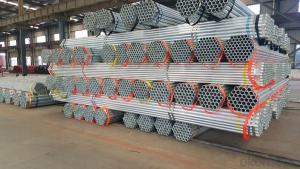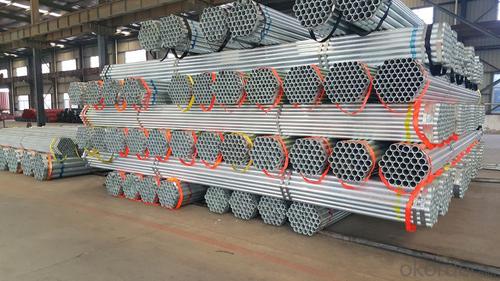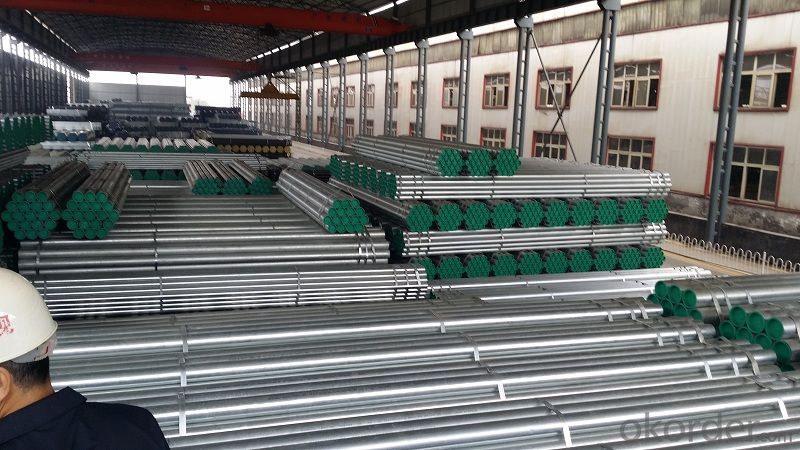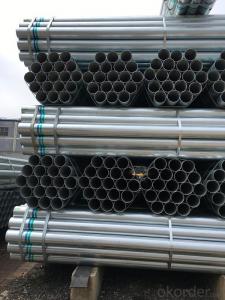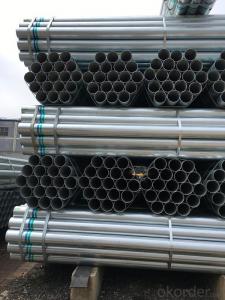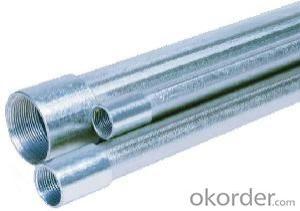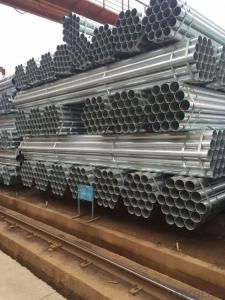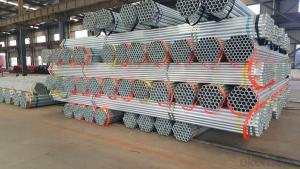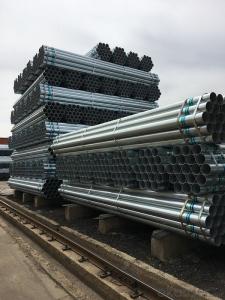Galvanized welded steel pipe for gas pipeline
- Loading Port:
- Shanghai
- Payment Terms:
- TT OR LC
- Min Order Qty:
- 15 m.t.
- Supply Capability:
- 12000 m.t./month
OKorder Service Pledge
OKorder Financial Service
You Might Also Like
Specification
1、Structure of Galvanized welded steel pipe for gas pipeline :
The surface of galvanized steel pipe welded steel pipe of hot dip galvanized layer or. Galvanized can increase the corrosion resistance of the steel tube, prolong service life. Galvanized pipe is widely used, in addition to water, gas, oil and other general low pressure fluid pipelines. It is also used in the petroleum industry, especially for offshore oil field of oil well pipe and oil pipe, chemical, coking equipment of oil heater, condensation cooler, coal run oil exchanger tube, and trestle pile, the mine tunnel support frame tube.
2、Main Features of Galvanized welded steel pipe for gas pipeline :
• High manufacturing accuracy
• High strength
• Good visual effect
• Reasonable price
3、 Galvanized welded steel pipe for gas pipeline Specification:
Standard | GB, DIN, ASTM ASTM A106-2006, ASTM A53-2007 |
Grade | 10#-45#, 16Mn 10#, 20#, 45#, 16Mn |
Thickness | 1 - 33 mm |
Section Shape | Round |
Outer Diameter | 21 - 610mm |
Place of Origin | Tianjin, China (Mainland) |
Secondary Or Not | Non-secondary |
Application | Hydraulic Pipe |
Technique | Cold Drawn |
Certification | API |
Surface Treatment | factory state or painted black |
Special Pipe | API Pipe |
Alloy Or Not | Non-alloy |
Length | 5-12M |
Outer Diameter | 21.3-610mm |
Grade | 20#, 45#, Q345, API J55, API K55, API L80, API N80, API P110, A53B |
Standard | ASME, ASTM |
1) Material:Q195 Q235 Q345 X42 X52
2) Specification range:OD:21.3-610mm,WT:6-70mm,length:6-12m or according to the requirement of clients.
3) Excutive standards:GB,ASME API5L.ASTM A 106/A53,Despite of the above standards,we can also supply seamless steel pipe with standard of DIN,JIS,and so on,and also develop new products according to the requirements of our clients!
4) Surface: galvanized.
5) Ends:Beveled or square cut,plastic capped,painted.
6) Packing:bundles wrapped with strong steel strip,seaworthy packing.
4、Packaging & Delivery
Packaging Details: | seaworthy package,bundles wrapped with strong steel strip |
Delivery Detail: | 15-30days after received 30%TT |
5、FAQ of Galvanized welded steel pipe for gas pipeline :
①How is the quality of your products?
Our products are manufactured strictly according to national and internaional standard, and we take a test
on every pipe before delivered out. If you want see our quality certifications and all kinds of testing report, please just ask us for it.
Guaranteed: If products’ quality don’t accord to discription as we give or the promise before you place order, we promise 100% refund.
②How about price?
Yes, we are factory and be able to give you lowest price below market one, and we have a policy that “ for saving time and absolutely honest business attitude, we quote as lowest as possible for any customer, and discount can be given according to quantity”,if you like bargain and factory price is not low enough as you think, just don’t waste your time.Please trust the quotation we would give you, it is professional one.
③Why should you chose us?
Chose happens because of quality, then price, We can give you both.Additionally, we can also offer professional products inquiry, products knowledge train(for agents), smooth goods delivery, exellent customer solution proposals.Our service formula: good quality+good price+good service=customer’s trust
SGS test is available, customer inspection before shipping is welcome, third party inspection is no problem.
6、 Galvanized welded steel pipe for gas pipeline Images:
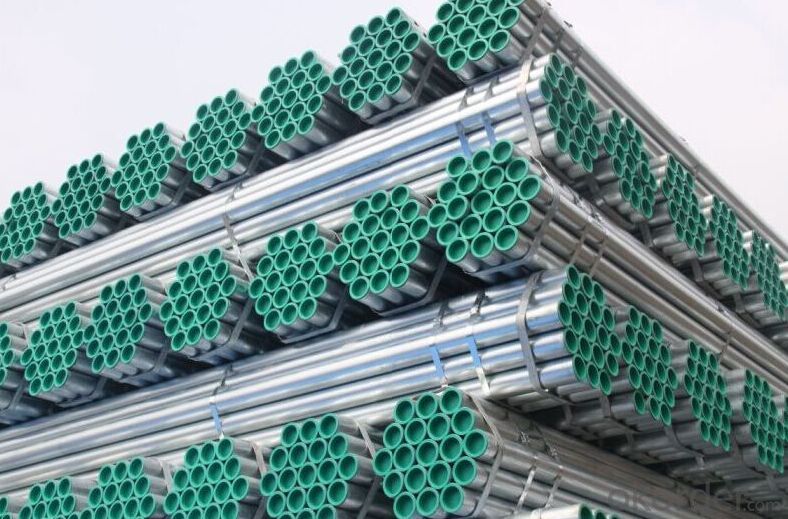
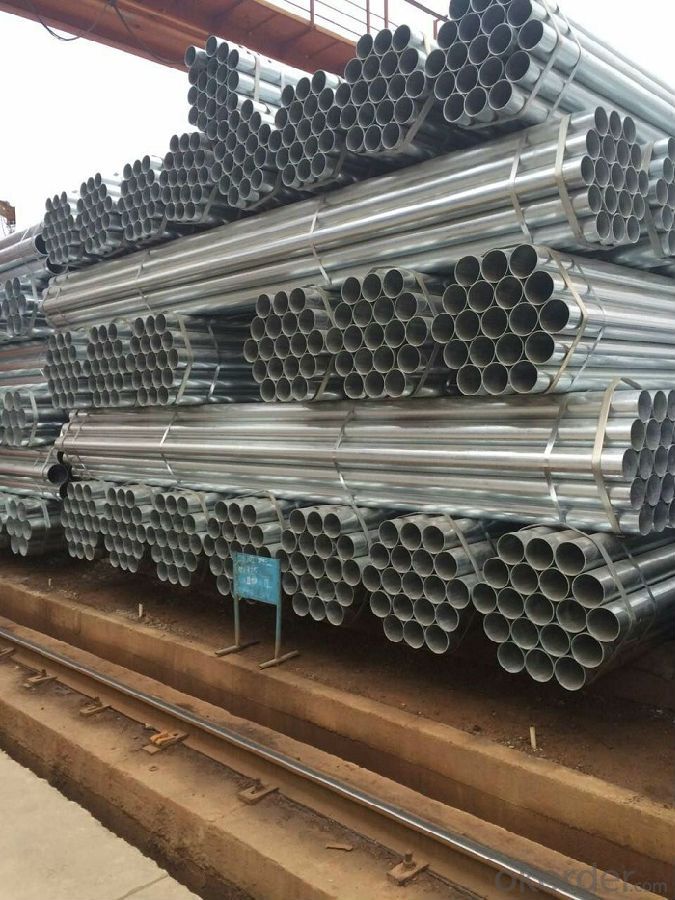
- Q: What is the standard length of a steel pipe?
- The industry and application dictate the standard length of a steel pipe, which can vary. In general, steel pipes typically range from 18 to 24 feet in length. These lengths find common usage in construction, plumbing, and various industrial applications. It is worth mentioning that custom lengths are also available to accommodate specific project needs.
- Q: What is the role of steel pipes in the construction of bridges and tunnels?
- Steel pipes play a crucial role in the construction of bridges and tunnels. They are extensively used for various purposes due to their strength, durability, and versatility. In bridge construction, steel pipes are commonly employed for the fabrication of the bridge's structural framework. They serve as the primary load-bearing members, providing support and stability to the entire structure. Steel pipes are particularly favored in bridge construction due to their high tensile strength, which enables them to withstand heavy loads, including the weight of vehicles and the dynamic forces generated by traffic. Steel pipes are also utilized in the construction of bridge piers and abutments. These components provide the foundation and support for the bridge structure. Steel pipes are often driven deep into the ground to create sturdy foundations that can withstand the forces exerted by the bridge's weight and external factors such as wind, water currents, and seismic activity. Similarly, steel pipes are essential in tunnel construction. They are extensively used in tunnel lining, which refers to the installation of structural elements along the tunnel walls and roof to provide stability and prevent soil or rock collapse. Steel pipes are often used as reinforcement elements, ensuring the structural integrity of the tunnel and protecting it from external pressures. Moreover, steel pipes are employed for underground utility systems in both bridges and tunnels. They serve as conduits for various utilities such as water supply, electrical cables, gas pipelines, and communication lines. Steel pipes are ideal for these applications due to their corrosion resistance, ability to withstand high pressures, and longevity. Overall, the role of steel pipes in the construction of bridges and tunnels is to provide strength, stability, and durability to the structures. They play a vital role in ensuring the safety and functionality of these critical infrastructure projects, allowing for efficient transportation and the seamless provision of utilities.
- Q: What are the common applications of galvanized steel pipes?
- Galvanized steel pipes are commonly used in various industries and applications such as plumbing, water supply systems, gas pipelines, electrical conduits, construction projects, fencing, and outdoor structures. The galvanization process adds a protective zinc coating to the steel, making it resistant to corrosion and extending its lifespan, making it ideal for applications requiring durability and longevity.
- Q: Are steel pipes suitable for use in chemical plants?
- Yes, steel pipes are suitable for use in chemical plants. Steel pipes have excellent resistance to corrosion and high temperatures, making them ideal for transporting various chemicals and fluids in a safe and efficient manner. Their strength, durability, and versatility make them a preferred choice in the chemical industry.
- Q: Are steel pipes suitable for hydronic heating systems?
- Yes, steel pipes are suitable for hydronic heating systems. Steel pipes are known for their durability, strength, and resistance to high temperatures and pressure, making them an excellent choice for circulating hot water in hydronic heating systems. They can effectively handle the demands of heating systems and provide reliable and long-lasting performance.
- Q: What is an electric welded pipe (EFW)? Seek help!
- It is through one or several consumable between the electrode and the workpiece on the metal heating the metal between a process with the arc to metal and filler material fully melted, no pressure, filler metal parts work from all electrodes
- Q: How are steel pipes used in nuclear power plants?
- Steel pipes are extensively used in nuclear power plants for various purposes. They are primarily used for the transportation of coolant, such as water or gas, which helps in removing heat from the reactor core. Steel pipes are also used to convey steam generated by the reactor to the turbine, where it is used to generate electricity. Additionally, steel pipes are utilized for the transportation of various fluids, such as lubricants and chemicals, for different processes within the plant. The durability, strength, and resistance to high temperatures and pressure make steel pipes an ideal choice for these critical applications in nuclear power plants.
- Q: How are steel pipes insulated for thermal efficiency?
- Steel pipes are insulated for thermal efficiency by applying a layer of insulating material, such as mineral wool or foam, around the pipe. This insulation helps to reduce heat transfer and prevent energy loss, ensuring that the pipes maintain the desired temperature and improve overall thermal efficiency.
- Q: What are the factors affecting the durability of steel pipes?
- The factors affecting the durability of steel pipes include corrosion, temperature, pressure, mechanical stress, and the quality of the protective coatings or linings applied to the pipes. Additionally, the composition and purity of the steel used in the pipes, as well as the design and construction of the pipeline system, can also impact its durability.
- Q: What is lined pipe?
- Is the coating of the inside of the pipe, such as pipe conveying sulfuric acid will corrode, corrosion, but soft plastic pipe, buried in the ground to wall thicker, then you can use the liner and characteristics of hard for using steel pipe laying, sheathed in the steel pipe into the thin plastic tube, it can transport the sulfuric acid,
Send your message to us
Galvanized welded steel pipe for gas pipeline
- Loading Port:
- Shanghai
- Payment Terms:
- TT OR LC
- Min Order Qty:
- 15 m.t.
- Supply Capability:
- 12000 m.t./month
OKorder Service Pledge
OKorder Financial Service
Similar products
Hot products
Hot Searches
Related keywords
